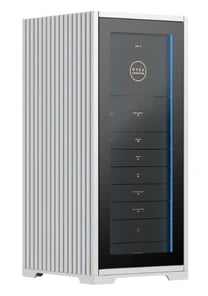
TL; DR: ORCA Computing provides photonic-based quantum computing with an application emphasis on machine learning. Launched in 2019, the company set out to make quantum computing more accessible and usable for companies by delivering an integrated solution for traditional environments and modern use cases, including generative modeling. Its PT-1 Series is air-cooled and rack-mounted, leveraging telecom-grade optical fiber components for a scalable, less complex quantum system. With ORCA Computing, companies can access the power of quantum computing for faster results in machine learning, and more use cases are on the horizon.
If you’re anything like me, when you hear the words “quantum computing,” you may think of the TV show Quantum Leap or some far-off, futuristic technology that seems too complex to understand. But quantum computing is more present and usable than you may think.
Quantum computing is a multidisciplinary field that includes computer science, physics, and mathematics, and that uses quantum mechanics to solve complex problems faster than on classical computers — even the largest supercomputers.
Although most of the quantum computing industry is still in its infancy, with many companies remaining in the research and development stages, some businesses are already making leaps and bounds in the application space. ORCA Computing is one of these companies. ORCA Computing leverages photonics to develop a more practical approach to quantum computing and make it more accessible and usable for new customers.

“Photonics turns out to be a more straightforward approach. It’s something that’s already used today in telecoms. So it allows you to use standard telecom equipment for an easier starting point,” said Per Nyberg, Chief Commercial Officer of ORCA Computing.
ORCA Computing has been breaking down barriers to user adoption with its PT Series. The ORCA Computing founders share more than 30 years of academic research they used to combine their proprietary technology with telecom equipment to make quantum computing readily available to companies. Its PT series is robust to keep costs down and accessible for growing use cases, including generative machine learning.
Taking a Practical Approach to Address Use Cases
Headquartered in London, UK, ORCA Computing is a product of a team from the University of Oxford, founded by Professor Ian Walmsley, Richard Murray, and Josh Nunn. Quantum computers can take on various approaches. But the team decided to launch ORCA Computing based on a photonics approach because it was the easiest entry point, especially if it wanted to build and scale its computing over time.
Quantum computing is a specialized form of computing, and its future is to be a complementary piece in traditional environments rather than overtake classical computers. “Quantum computers can’t do everything that a classical computer can do. So the classical computer is never going away. The reality is that quantum computing will be used in portions of classical computing,” said Per.
The unique capabilities and characteristics of quantum computing makes it a fantastic candidate for use cases such as machine learning and generative modeling.
“Let’s say you’re doing generative modeling to create new images or synthetic data for financial services companies. You can get a higher-quality answer from combining quantum with classical in the same model. Over time, as quantum computers get faster, they’ll also be able to get better answers faster,” Per said.
Quantum computing has a lot of innovation and possibilities ahead of it as the industry is starting to take off. ORCA Computing has a leg up compared to its competitors because it already has affordable and effective solutions available. The future looks promising and bright, with universal quantum computing in the works.
“The road map is that our PT Series grows over time into being fully error corrected. And in the long run, you’ll get these larger systems,” said Per.
Increasing Accessibility With Full-Stack PT Series
Per said there is growing momentum in terms of building more usable, practical quantum systems. Companies are looking to make quantum computers more applicable, but that also involves educating companies on the capabilities and use cases of quantum computers.
“People are trying to understand what the technology can do and where in their business can quantum be applied. On the other side is the training and upskilling of people as well,” said Per.

With the tech industry’s labor shortages, finding specialists who can operate quantum computers will be essential for companies. But understanding quantum technology will be the first step. ORCA Computing’s emphasis on machine learning and modular approach has helped it release its PT series for practical use.
“We’re shipping systems today. A lot of quantum companies are still in R&D mode and will be for some time. But one of our cabinets is a standard 19-inch rack and air-cooled. And companies can put it in a datacenter,” said Per.
ORCA Computing’s PT Series leverages telecom-grade optical fiber components to deliver a rack-mounted, room-temperature solution that can fit into classical computing infrastructure and workflows. The company combined photonic technology with neural networks to promote machine learning processes, algorithms, and applications.
ORCA Computing has made quantum computing readily available and usable. Its PT Series is also open-source and Python-based with PyTorch interfaces, which allows users to leverage it without requiring expert knowledge of quantum computers. Still, the company says the PT Series is only the beginning.
Pushing Quantum Forward By Influencing User Adoption
Launched in 2019, ORCA Computing has made significant progress in-house and in the industry with its PT Series release and research. According to Per, companies within the quantum industry have been achieving a constant stream of breakthroughs. But getting companies to adopt quantum computing has been a challenge. ORCA Computing’s work and discussions have helped many businesses understand the benefits of quantum.
“We work with Fortune 500 companies in areas like quantum chemistry, so they’re getting this understanding of what can be done. And they’ll start to adopt the technology in a more significant way starting now or increasingly over the next couple of years,” said Per.
Quantum computers have been largely inaccessible to many industries because of their high pricing and complexity. Per said that, if the industry wants businesses to upskill their employees for quantum, it must make the technology accessible. That is why ORCA Computing created affordable solutions users can purchase and easily integrate into their traditional systems.
ORCA Computing’s first customer was the UK Ministry of Defense. Its PT-1 system was able to help the government entity with everything from machine learning to solving optimization problems.
“Our focus on machine learning and software development kit, which you can use for standard machine learning models today, means people can get started. We need to ramp up user adoption so that the industry can continue to grow,” said Per.



